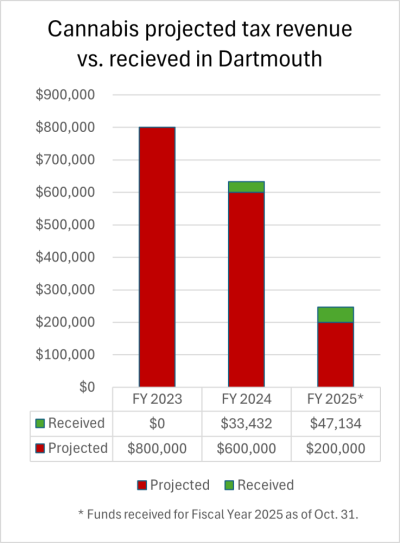Host of problems: The blunt reality of cannabis business in Dartmouth
The Dartmouth Select Board will not be willingly accepting host community agreements with the town’s cannabis businesses anytime soon, according to Select Board Chair Shawn McDonald.
After rejecting two agreements at prior board meetings with Solar Cannabis and Apotho Therapeutics, the Select Board has made it clear they are unhappy with the state's changes that now limit the authority of municipalities over the agreements and the revenue it receives.
“[The state] threw this big, giant carrot at all the communities to all accept this,” McDonald said. “The communities bought into it, and then they changed it completely. And as far as I'm concerned the state failed to live up to its initial proposals to the communities.”
He added, “If the state is going to force us, I don't have a problem fighting the state on this because they changed the rules midstream.”
The new state regulations, which took effect March 1, give the Cannabis Control Commission expanded oversight of host community agreements to ensure equity in the cannabis industry.
State Rep. Christopher Markey said now that the “first generation” of cannabis businesses have been established, the businesses have their own competition and previous regulations left some at a disadvantage with municipalities having leeway over fees in the host agreements, which can be overburdening when one town levies higher fees over another.
He said the municipalities were relying too heavily on the revenue.
“We learned from our mistakes — we corrected them to balance it out,” Markey said.
While he understands the concerns, which were also raised by the Massachusetts Municipality Association, he said the agreements were never meant to be a “money grab for municipalities.”
He added, “You want the industry to be able to flourish and be competitive and putting limits on it, I think, is a reasonable condition of having the host agreement.”
When voters made their decision about the cannabis industry, there were concerns about public safety from municipalities, which is why the host community agreements were created, Markey said.
Now, a few years into having some established businesses, the state has observed no “mass chaos” or threats to public safety as a result, he added.
Prior to the recent changes to regulations, the community impact fee — which was designed as a set percentage of a business’ sales to accommodate for uses of municipality resources, such as increased police presence — has been altered. Businesses now only have to pay for exactly what was used.
McDonald said this change has “made it so convoluted, so complex, that it's just not worth having in the community anymore.”
Besides the impact fee, the town receives 3% in tax revenue from cannabis business. The excise tax is optional and was established by Town Meeting in 2019.
Gary Carreiro, interim co-town administrator, said when the town received its first applications for the businesses, it anticipated receiving $800,000, which was projected in the Fiscal 2023 budget. However, the town saw no revenue that year.
Given this outcome, the anticipated amount for the following fiscal year was decreased to $600,000 and with Solar Cannabis beginning its operation in March 2023, the town saw one quarter of revenue, which amounted to approximately $33,432, according to Carreiro.
For Fiscal Year 2025, which began on July 1, the projected revenue was brought down to $200,000, Carreiro said. As of Oct. 31, the town has received approximately $47,134 in revenue.
“The whole dynamic has changed, so what was anticipated for revenue two years ago when these facilities moved into town really isn’t what we've seen for revenue now two years later,” he said.
Carreiro added when the revenue fails to meet the budgeted projection, it needs to be made up with revenue from other local receipts.
“We have to be cautious with our revenue anticipation and estimates,” he said. “Going forward we have to be conservative with those dollar amounts and closely monitor the revenue.”
Under state regulations, licensees cannot operate without a valid host agreement in place, according to the Cannabis Control Commission. When a municipality intends to discontinue relations with a business, it must notify the commission and the licensee may submit a request for Equitable Relief in order to continue operation.
Markey said the licensee could pursue legal action as long as they are following all state bylaws and regulations.
McDonald said the state made it “not feasible” for municipalities like Dartmouth to complete a host community agreement, “so any future host agreements coming into the town, I'm not going to be voting for it.”
Solar Cannabis and Apotho Therapeutics have not responded to requests for comment.



.jpg)











